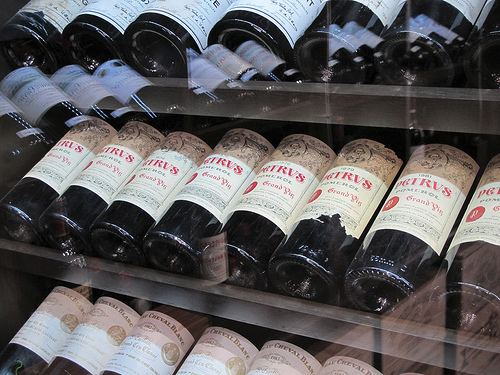The price of everything the value of nothing
Chateau Petrus, sadly the ’78 is missing. Image courtesy of cDubya.
One of the key tenets of behavioural theory is that we value more the things for which we pay more. The more expensive the wine, the greater quality we believe it to be and the more that we value it. So how come this idea doesn’t seem to hold water when it come to clients and the value they place on agencies.
Theoretically the more money that a client is paying an agency the more you would think that they value the recommendations and output of that agency. But I wonder if precisely the opposite is true. That clients view the not insubstantial fee that they are paying not as remuneration for the quality of agency’s contribution to the fame and fortune of the brand but as a fee for a service. The sort of service that involves hanging on the client’s every word, taking any number of fruitless meetings with them, fluffing their individual and collective egos and having good and possibly great work rejected or unpicked until there is nothing of quality left. Much like her client pays a call girl to go out with him, listen attentively, make him look good in public and then pleasure him in the bedroom department.
Conversely, the clients that pay an agency nothing at all seem to value it far more highly and take its recommendations rather more seriously, so called pro bono clients. Now this could simply be out of gratitude for the time that the agency is investing for no financial return but I think it goes rather deeper than this.
Bizarrely, the less commercial the relationship the more professionally you are seen, as if the exchange of money demeans your engagement with the client, your sense of partnership and the objectivity of your advice. Unpaid, you are seen as truer business partners.
Is this unique to advertising? Are we the only industry where the greater we are remunerated the less professional we appear and the less like partners we are treated, as if clients are saying ‘well you’ve got your money, now do what we say’? I can’t see this being the relationship that McKinsey or Foster Partners enjoy with their clients where the cost of their advice is directly correlated to its percieved quality. Whereas hiring a great agency and then making them produce tat is rather like putting the Chateau Petrus 1978 in your spaghetti Bolognese.
Discover more from
Subscribe to get the latest posts sent to your email.


Like the call girl analogy.
Perhaps it’s a bit like when someone takes you out for dinner. You enjoy it more than when you pay for yourself becuase it feels like a treat. Suddently it’s not just about the food but the joy that comes from someone having done something nice for you for no other reason than they wanted to? Or maybe I just like being taken out for dinner.
Interesting question. I don’t know what data you’re drawing on (your personal experience, colleagues’ knowledge, market research), but these are two questions I’d ask before trying to draw any conclusions:
1) You say that “The less commercial the relationship, the more professionally you are seen”, but you only mention “unpaid” and “pro bono” in your examples. Is “free” part of the same continuum as other prices, or is it a separate category? Looking at non-free examples of varying price, what is the relationship between price and value like?
2) Is it possible that the paying and pro bono clients are just different types of companies, and that this difference confounds the price-value pattern? For example, are paying clients (especially those who can afford really high fees) more stubborn because they are well-established, have more experience and feel more confident?
I suspect one of the reasons McKinsey et al get paid properly is their attention to detail including their ability to spell. Pack your over inflated ego away and learn the basics. Then perhaps when we are spending our hard earned cash we might spend it on you.
Absolutely Correct Chris!!
Interesting post.
I think free things maybe valued because of what their ‘real’ perceived value is. i.e. We had a £500 bottle of wine for free. So much easier with a product than a service / advice.
Overall people tend not to value free or cheap things, it’s what brands want to avoid, i.e reducing price to increase sales. How good can something that is free or cheap be i.e. why is it free or cheap etc. Also if you have good advice, profitable advice, to give – why would you give it to me for free? Charity maybe one reason of course.
I think the reason client relations sometimes break down is because once the fees are paid the service does not live up to expectations, in fact it becomes yes, yes, yes, and lack quality advice. Which maybe a different matter altogether.
Jim
I guess that’s my point – the quality of advice offered and accepted when the relationship is financially based. Agencies too scared of offending the client that they offer poor advice and clients feeling that paying the money means they don’t have to listen to sound advice. And this comes back to whether clients are paying for a service or a product. For my money to has to be a product – whether strategic or executional.
Agencies seem much more confident on pro bono work and similar since if a client disagreed with the recommendation its no skin of their financial nose.
Of course this whole issue is philosophical if it is anything more than a bit of fun since an agency undertaking pro bono work exclusively wouldn’t have much of a life span.